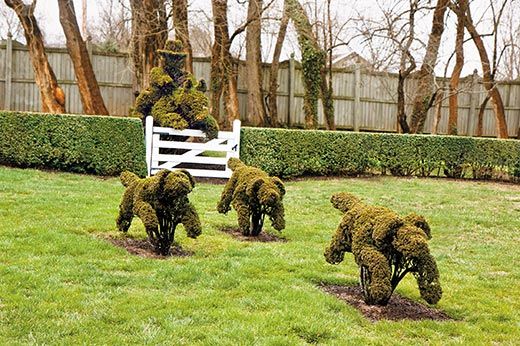Ladew Topiary Gardens
Clipped hedges and a house full of antiques are the main attractions for this museum north of Baltimore, Maryland
The best place for watching the fox hunt at Harvey S. Ladew’s estate in Monkton, Maryland, is with the naked ladies. You stand among them under expansive trees, where the fox hunt never ends, regardless of season. That is because Ladew sculpted his life-size hunting scene—with fox, running hounds and mounted riders—out of living yew hedges.
Ladew, a socialite transplanted from Long Island, New York, lived hard, partied hard and planted exuberantly before he died in 1976 at age 89. Today, his antique-stuffed house and his topiary gardens attract over 30,000 visitors a year.
In one section of the gardens, one finds a statue of Adam and Eve: Adam accepts the forbidden fruit from Eve while hiding two apples behind his back. In another, Ladew has clipped a hedge into the shape of a fat man walking a tiny dog, his irreverent tribute to a Henry Moore sculpture.
“Mr. Ladew liked Henry Moore, but he didn’t have much use for modern art,” says Emily Wehr Emerick, executive director of the gardens. We’re in the Ladew house, where she pauses before a Picasso-inspired portrait of Ladew in hunting colors, with his nose on the side of his face where an ear should be. “It was a joke painted by his friend Elsa Voss,” says Emerick, who leads the way to Ladew’s oval library. She pulls a handle on one bookshelf, which swings open to reveal a secret entrance to the gardens—Ladew’s sanctuary when unwanted visitors appeared. “The housekeeper could honestly say he had stepped out for a moment,” says Emerick.
Near the garden’s entrance is a carpet of naked lady lilies that would soon burst into bloom. “[Ladew] had admired the lilies in a friend’s garden,” says chief gardener Tyler Diehl. “The friend cabled to say he would send 50 naked ladies to Monkton if Mr. Ladew could handle them. Mr. Ladew cabled back, saying that he could easily handle 50 naked ladies if they were disease free. Of course he knew the message would scandalize telegraph operators on both ends, which was part of the fun.”

